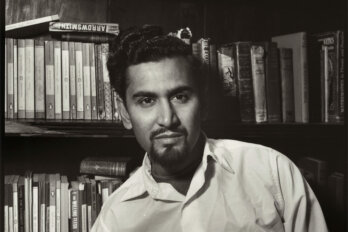Adecade ago, when I was asked to represent the voice of the young on an intergenerational panel of LGBT authors, novelist R. M. Vaughan spoke of a lavender ceiling. He claimed that gay literary authors who write honestly about contemporary gay life are rarely published to wide acclaim by mainstream publishers in Canada, and are often relegated to the sidelines and the small presses. I was both sobered by his comment and buoyed to be a part of what might be the generation for which that has shifted.
Largely, his observations remain true, even though many of Canada’s prestigious houses publish lesbian writers, some who are celebrated around the world. These include Dionne Brand; Emma Donoghue; Helen Humphreys; Shani Mootoo; Marnie Woodrow; and, of course, the iconic, Oprah’s Book Club–approved Ann-Marie MacDonald. Still, the easiest way to break through the ceiling commercially is to write mostly about straight characters, or to place your queer stories in a historical setting. One example of many is Emma Donoghue’s most recent novel with contemporary queer themes, Landing (2007), which was her only commercial flop, while her historical fiction—which also includes queer characters—sells well to a mainstream audience.
This is a failure on the part of publishers to advance with the times. When acquiring manuscripts, editors worry that such books won’t sell, that they are too niche or specialized. If they are published, sales teams aren’t sure how to market them to a wider audience. At every level, there is reticence to put faith in an intelligent reading public. (The most effusive fan encounters about my own fiction that included queer content involved a stoic, retired heterosexual couple from northern Manitoba; and a sixty-five-year-old straight man who arrived at a book-signing with eight books,* even the obscure, out of print ones.) Donoghue’s biggest success was Room (2010), a crime novel with no queer characters; it was a Man Booker finalist, and won the Rogers Writers’ Trust Fiction Prize and a slew of other awards. While publishers do not control what a jury fancies, they do decide which titles are hyped prepublication, and that influences which ones are the most seen and discussed by booksellers, critics, and readers.
I have often thought that if any author could change Canadian publishing’s reticence to promote present-day queer stories, it would be Ann-Marie MacDonald. Her historical debut, Fall on Your Knees (1996), sold a phenomenal 240,000 copies, even before Oprah recommended it. Her second novel, The Way the Crow Flies (2003), was also a bestseller and a Giller Prize finalist. The books’ combined success means she has more freedom than most. She could probably write a piece narrated by two dolphins and still make her advance back in the first week of sales.
This fall, MacDonald published her third novel, Adult Onset, about Mary Rose MacKinnon, a late-forties lesbian writer who lives in Toronto’s Annex neighbourhood with her theatre-director wife and two young children, struggling to write her third book while dealing with the stresses of parenting. One only has to do a cursory Google search to see that MacDonald herself has two kids and a theatre-director partner, and that her fans have been waiting for a new book for more than a decade. MacKinnon is a successful young-adult novelist, with admirers who accost her at Starbucks asking for a photo op and demanding to know when the third volume of the Otherwhere Trilogy will come out. MacDonald enjoys making fun of herself in these moments, and offers a low-glamour account of the demands of life as both a writer and a parent.
The novel takes place over one week, interspersed with frequent flashbacks to the protagonist’s childhood, told from alternating third-person viewpoints. Mary Rose, nicknamed Mister, slowly unravels while she looks after her two children, ages two and five. The stress and ennui of parenting, and the eroding passion in her marriage, combine with a returning pain in her arm reminiscent of the bone cysts she suffered from as a child—and her elderly parents, Dolly and Duncan, are about to come for a visit.
Woven throughout the narrative are segments about Dolly’s experiences with miscarriage and stillbirths, and the postpartum depression she experienced after the death of a son when her daughter was two. Mary Rose obviously can’t recall details from such a young age clearly. Why does she remember hanging over the side of a balcony? Where did the pain in her arm originate? When did her brother die? Here the authorial obsessions of Fall on Your Knees—intergenerational trauma, stillbirth, and family secrets—come into play.
What it means to be a parent and to parent well are major preoccupations of Mary Rose, both in terms of how to get her toddler to put her boots on and in reflecting on how she was raised. Mary Rose is cranky about a lot of things, and makes corny, dated jokes while worrying about aging. These jokes are at times irritating, but so is Mary Rose, as she is hell-bent on self-destructing. She presents to others as calm and capable, but is actually seething with rage. Her occasional explosive fits, and subsequent periods of self-loathing, are eloquently and viscerally described as she approaches the fraying ends of her rope. One can’t help but feel for her as she moves through a series of days just trying to keep it together, dealing with phone calls from her aging parents and emotionally demanding siblings, not to mention minding her own children.
Books about writers and writing about family life go in and out of fashion. Last summer, all anyone in the literary world could talk about was Norwegian writer Karl Ove Knausgaard’s trilogy about an author who is struggling to create while also being a parent and husband (only three of his six books have been translated into English so far). Based on Knausgaard’s life, the works could be called memoir, though his publisher markets them as novels. The cover of the first volume features the author’s forty-something hungover-looking face. If a woman of similar age placed a haggard photograph of herself on a cover, called it My Struggle, and wrote about her parental rage and ambivalence, she’d likely be crucified. But critics and fellow authors are lining up to praise Knausgaard; a cover blurb calls him “a living hero.” It will be interesting to see whether there is a double standard for Adult Onset.
Mary Rose is also preoccupied with her mother’s life, and her own frustrations around how she came to be this married, successful parent person. She knows she has a lot to be thankful for, privilege-wise, but this doesn’t soothe her:
There is not a single aspect of her life that is not of her own choosing. She has nothing to complain about and much to be grateful for. For which to be grateful, corrects her inner grammarian. She came out when homosexuality was still classed as a mental illness by the World Health Organization, otherwise known as the WHO (Me?). She helped change the world to the point where it-got-better enough for her to be here now at her own kitchen table with her own child, legally married to the woman she loves, feeling like a trapped ’50s housewife. That was a glib thought. Unjust. Unfeminist. Her life is light years away from her own mother’s.
Where Adult Onset truly transforms from an ordinary housewife domestic-saga-with-a-twist to a story that has never been written before is when it gets to the heart of the trauma of parental abandonment after coming out, and its lifelong effects. Her parents, who love and embrace her wife, Hilary, and their two kids, are happy to share their emotional response to the It Gets Better campaign videos, and seem to have forgotten that they once looked across the kitchen table at a twenty-three-year-old Mary Rose and said, “I’d rather you have cancer,” and “I’d rather you’d been born dead.”
After a decade or so of cruelty and abandonment, they re-emerge, asking her and her then girlfriend, Renée, to come to dinner as though they were never estranged. But the impact of those words lingers, especially as the rest of the family continues to operate as though those years were simply erased—another thematic similarity to Fall on Your Knees. MacDonald describes this dizzying but familiar experience of those who came out before the It Gets Better era, who often faced homelessness, abuse, and violence as they fought for every freedom. If decades later some are married, parenting homeowners living hetero-normative lives that their parents have finally embraced, what happens to that rage?
“Enjoying your post-gay civil rights? You’re welcome” is printed on buttons R. M. Vaughan gave out at the Toronto Pride Parade a few years ago. Mary Rose would probably wear one of those pins. When she encounters young fans with gleefully ambiguous orientations, she finds herself “scrambling to keep up with the world she helped to change,” and describes her best friend thusly:
She called herself a dyke back when you could still get beaten up for it on a Friday night, she called herself a dyke when you could be censured for it by lesbian feminists, she called herself a dyke when lesbian feminists reclaimed the word, and she still calls herself a dyke now that “queer” has rendered the term quaint. “I’m a dykosaur,” she likes to say.
Adult Onset succeeds in two specific ways: via unique depictions of MacDonald’s own generation of gay people through the eyes of Mary Rose, and in the vivid and terrifying descriptions of what it’s like to experience rage while you are caring for a child. Adult Onset is less successful when MacDonald provides examples of chapters from Mary Rose’s YA adventure series, which pull the reader out of the text and slow the pace of the story while not adding anything entirely crucial or new to the narrative.
It’s brave for any parent to write about anger, an emotion so taboo it’s difficult to admit these days without arousing concern. It’s one of the reasons Knausgaard is praised for his honesty. Will MacDonald be lauded for being similarly forthcoming? Adult Onset shows us a new Ann-Marie MacDonald, one who is willing to break away from the safe scaffolding of a historical structure and offer readers some unflinching and realistic takes on the traditional domestic novel, exploring what it’s like for anyone struggling to raise kids in an age of perfection parenting. It’s a lively, moving, and often funny story that has the potential to help usher in a new era of honest literary depictions of families in all their permutations.
This appeared in the November 2014 issue.






